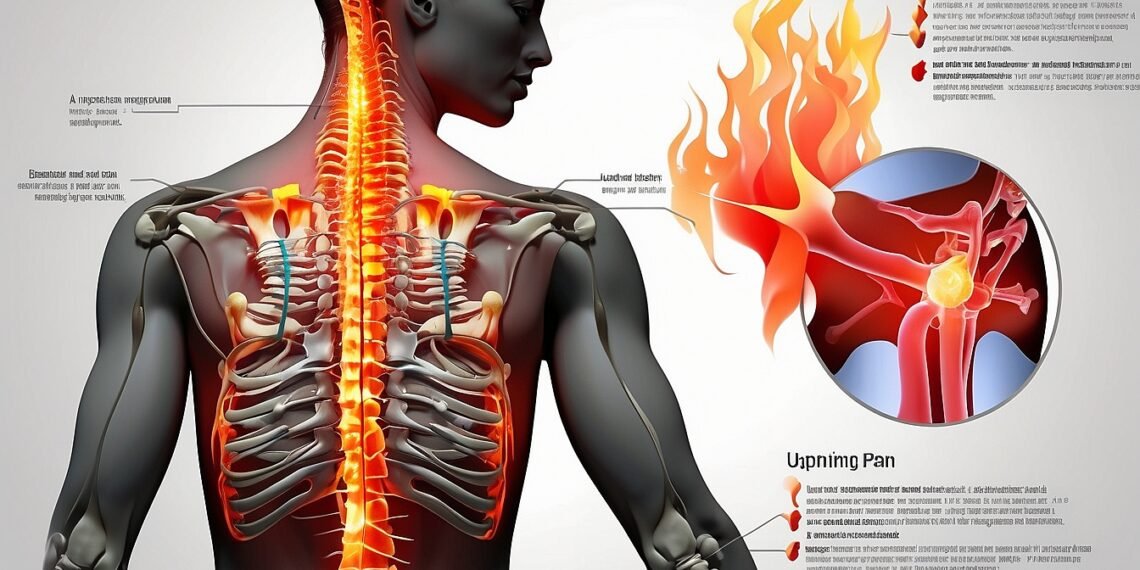Relieving Burning Pain in Upper Back:
Burning pain in your upper back can result from various factors, including muscle strain, nerve irritation, or even underlying medical conditions. Addressing the cause is crucial for effective relief.
Direct and Indirect Mechanisms:
- Muscle strain: Overuse, poor posture, or sudden movements can strain upper back muscles, leading to burning pain.
- Nerve irritation: Pinched nerves in the neck or upper back can cause radiating pain with burning sensation.
- Underlying conditions: In some cases, burning pain can be a symptom of conditions like shingles, acid reflux, or arthritis.
Treatment Options:
- Rest and pain relievers: Over-the-counter pain relievers like ibuprofen or acetaminophen can help reduce inflammation and pain.
- Heat or cold therapy: Applying heat or cold packs to the affected area can improve blood flow and promote healing.
- Stretching and gentle exercise: Specific stretches and exercises can help improve flexibility and reduce muscle tension in the upper back.
- Posture correction: Maintaining good posture while sitting, standing, and sleeping can prevent muscle strain and burning sensations.
- Massage therapy: A professional massage can help relax muscles, improve circulation, and reduce pain.
Definitions:
- Muscle strain: A tear or injury to a muscle or its attachment to a bone.
- Nerve irritation: Inflammation or compression of a nerve, causing pain, numbness, or burning sensations.
- Shingles: A painful viral infection caused by the varicella-zoster virus that can cause burning pain, along with a rash and blisters.
- Acid reflux: A condition where stomach acid flows back up into the esophagus, causing heartburn and sometimes pain in the upper back.
- Arthritis: Inflammation of the joints, which can cause pain, stiffness, and swelling in the upper back.
When to See a Doctor:
- If the pain is severe, persistent, or worsens despite home remedies.
- If you have numbness, tingling, or weakness in your arms or hands.
- If you experience fever, chills, or a rash.
- If you have difficulty breathing or swallowing.
- If you have concerns about the underlying cause of the burning pain.
Additional Resources:
- PDF: https://www.mayoclinic.org/symptoms/muscle-pain/basics/definition/sym-20050866: https://www.mayoclinic.org/symptoms/muscle-pain/basics/definition/sym-20050866
- YouTube video: https://www.youtube.com/watch?v=Q8dLMn5wG9k: https://www.youtube.com/watch?v=Q8dLMn5wG9k
Remember, consulting a healthcare professional is crucial for accurate diagnosis and personalized treatment of burning pain in your upper back.
Follow-up questions about burning pain in upper back:
Pain specifics:
- How would you describe the burning sensation (intense, dull, throbbing)?
- Is there a specific location where the burning sensation is most intense?
- Does the burning pain radiate anywhere else, like your arms, neck, or chest?
- Is the burning sensation constant or does it come and go?
- What activities or movements seem to make the burning pain worse or better?
- Have you noticed any other symptoms besides the burning pain, such as itching, fatigue, or difficulty sleeping?
Relationships:
- Does the burning pain affect your ability to work, participate in hobbies, or engage in social activities?
- Does the pain impact your relationships with family and friends?
- Are there any stressful events or changes in your life that might be contributing to the pain?
Treatment and management:
- What have you tried so far to relieve the burning pain, such as over-the-counter medications, home remedies, or alternative therapies?
- Have any of these treatments helped alleviate the pain, even if only temporarily?
- Are you open to trying other treatment options, such as physical therapy, massage therapy, or pain management techniques?
- How comfortable are you taking over-the-counter pain relievers, and are you aware of any potential side effects?
Other potential causes:
- Have you been diagnosed with any underlying medical conditions that could be causing the burning pain, such as arthritis, shingles, or acid reflux?
- Have you recently experienced any injuries to your back or chest?
- Do you have any risk factors for muscle strain or nerve problems, such as poor posture, repetitive activities, or smoking?
- Have you noticed any changes in your diet or medication that might be related to the burning pain?
Additional questions:
- Are you concerned about the potential cause of the burning pain?
- Have you had any similar experiences with burning pain in the past?
- What are your expectations for recovery and managing the pain in the long term?
- Do you have any questions or concerns about the burning pain that you haven’t had a chance to ask yet?
Providing detailed and accurate information about your pain can help your healthcare professional diagnose the underlying cause and develop an effective treatment plan.

